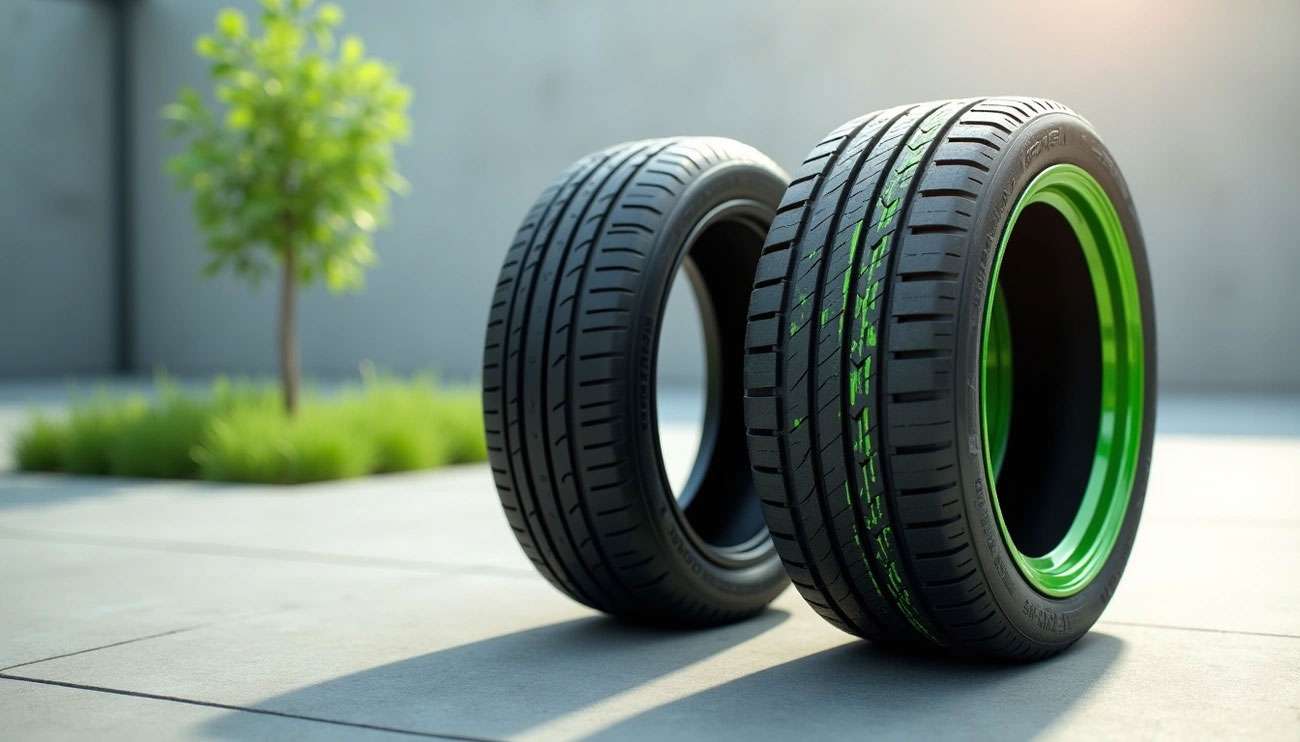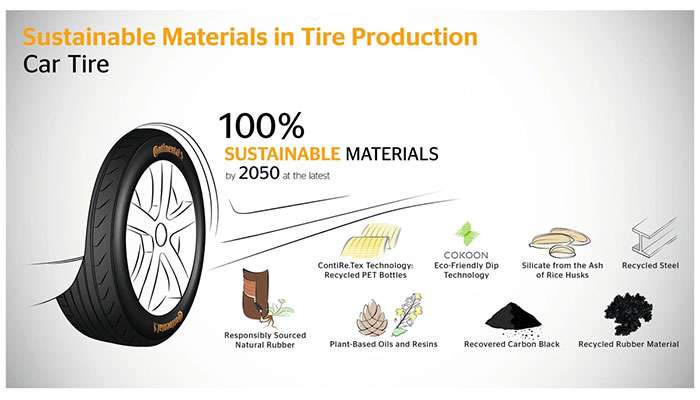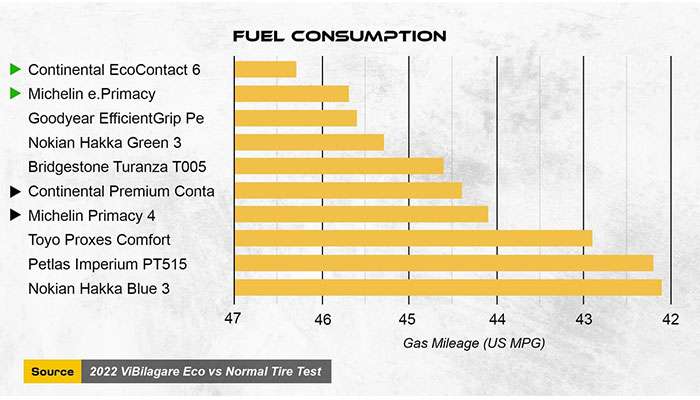
Eco friendly tires offer drivers a powerful combination of environmental responsibility and practical benefits that can improve both your vehicle's performance and your wallet. These advanced tires use sustainable materials instead of petroleum-based compounds, reducing environmental impact while delivering enhanced fuel efficiency—up to 8% according to leading chemical companies. The technology addresses real concerns drivers have about going green without sacrificing the performance they expect.
The skepticism many drivers once had about green tire technology is quickly becoming outdated. Major manufacturers like Bridgestone are now producing tires made from 75% recycled materials, with ambitious plans to reach 90% sustainable content. Continental has developed impressive products like the UltraContact NXT, which incorporates up to 65% recycled materials while maintaining superior performance standards.
Low-rolling resistance design is where these tires really shine for everyday drivers. You'll see better MPG or extended range if you drive electric, plus the improved durability means fewer tire replacements over time. This creates genuine savings that add up whether you're commuting daily or taking weekend road trips.
We'll walk you through everything you need to understand about eco-friendly tires, from the materials that make them work to how they perform on different road conditions, plus what you can expect to pay and save over time.

Image Source: recovery Magazine
Eco friendly tires distinguish themselves from conventional options through specific design elements and materials that work together to reduce environmental impact while maintaining performance standards. Understanding these key components helps drivers make informed decisions when selecting tires that deliver both sustainability and reliability.
Tire manufacturers are moving away from petroleum-based compounds by incorporating renewable and recycled alternatives into their construction. Plant-based materials like guayule and dandelion rubber offer sustainable alternatives to traditional rubber sources. These materials can grow in various climates, reducing pressure on forests while providing the flexibility and durability tires require. Modern eco tires also contain recycled rubber, bio-based polymers, and silica derived from rice husk ash.
The progress in sustainable materials has been impressive. Bridgestone produced a batch of 200 tires made from 75% renewable materials, while Continental's UltraContact NXT incorporates up to 65% recycled and renewable materials. Goodyear has developed a demonstration tire comprised of 90% sustainable materials, showing the direction the industry is heading.
Reduced rolling resistance represents the most significant performance feature in eco-friendly tire design. Rolling resistance measures the energy required to keep a tire moving, which directly affects fuel consumption. Studies show that 5–15% of fuel consumed by a typical gas vehicle goes toward overcoming rolling resistance.
The impact of rolling resistance improvements is substantial. A 10% reduction in rolling resistance yields approximately 1% better fuel economy. Commercial vehicles see even greater benefits—rolling resistance accounts for 30-33% of total fuel costs for Class 8 trucks.
Sustainable tire production extends beyond materials to include environmentally responsible manufacturing methods. Leading manufacturers have adopted key practices that reduce their environmental footprint:
Renewable energy usage in manufacturing plants
Water conservation through closed-loop recycling systems
Energy-efficient factories with lower carbon emissions
Cleaner curing methods that reduce volatile organic compounds
The sustainability story continues after tires reach the end of their useful life. Tire recycling rates have increased dramatically from 11% in 1990 to 79% in 2023, making tires one of the most recycled products in the United States.
Recycled tires find new applications across multiple industries:
Rubber modified asphalt for roads
Playground surfaces
Equestrian mats
New tire production
Alternative fuel sources
These end-of-life solutions create a circular economy for eco-friendly tires, extending their environmental benefits well beyond their time on vehicles.

Image Source: Tire Crunch
Eco friendly tires deliver measurable advantages that go well beyond just helping the environment. These advanced designs offer practical improvements that directly benefit your daily driving experience and long-term vehicle costs.
Low rolling resistance design creates the biggest advantage eco tires offer drivers today. The numbers speak for themselves: reducing rolling resistance by just 10% improves fuel economy by 1-2%. For typical drivers, eco-friendly tires boost vehicle fuel efficiency by 3-7%, which adds up quickly over time.
A car averaging 25 miles per gallon could save 18-42 gallons of fuel each year with the right eco tires. Some commercial fleets using tire monitoring systems like Tirematics have achieved CO2 emissions reductions equivalent to approximately 390,000 tons. These aren't small improvements—they represent genuine cost savings you'll notice at the pump.
Every gallon of fuel saved through fuel efficiency gains means less carbon dioxide released into the atmosphere. Sustainable tire manufacturing uses eco-friendly materials and processes that reduce emissions throughout the entire product lifecycle. Electric and hybrid vehicle owners see even greater benefits, as the improved efficiency extends their range while maintaining their environmental advantages.
Eco tires frequently outlast conventional options thanks to advanced materials and smarter construction methods. The combination of silica-enhanced compounds and optimized tread patterns extends tire lifespan significantly. You'll need fewer tire replacements over your vehicle's lifetime, which reduces both ongoing costs and environmental impact. These tires maintain consistent performance characteristics from the day you install them until replacement time.
Modern eco friendly tires include design innovations specifically engineered to reduce road noise. Continental's EcoContact 7 features a "Silent Pattern" with mini-sized spaces between tread blocks that significantly cuts exterior road noise. The Montreal Eco uses symmetric shoulder kerfs that lower noise levels while providing a more comfortable ride. These acoustic improvements create a noticeably quieter driving experience, especially valuable for city driving.
The combination of these benefits makes eco tires an smart choice for drivers who want environmental responsibility without giving up performance or comfort.
The old assumption that eco friendly tires compromise performance for environmental benefits simply doesn't hold up anymore. Modern green tire technology delivers performance that matches or beats conventional tires across most driving conditions.
Today's eco tires outperform older tire technologies in wet traction tests. The silica compounds grip better on wet surfaces, while the optimized tread patterns channel water away from the contact patch more effectively. You'll notice shorter braking distances on both dry and wet roads.
The lightweight construction and refined sidewall design make steering feel more responsive without sacrificing stability when you're taking corners. This means better control whether you're navigating city streets or highway on-ramps.
Here's what surprises many drivers: specialized rubber compounds in eco tires actually outperform conventional all-round tires in specific performance tests. The advanced design creates a quieter cabin experience, which becomes especially noticeable in vehicles with less engine noise.
Some eco tire models do trade a small amount of tread durability to achieve their low rolling resistance benefits. It's an engineering balance that most drivers find worthwhile given the fuel savings and extended tire life overall.
Electric vehicles create unique tire demands. They're heavier because of battery packs and deliver instant torque that can stress tires differently. Eco tires designed for EVs include enhanced durability features to handle this extra weight and torque without wearing out faster.
The Continental EcoContact 6 addresses these specific challenges with its premium Green Chili 2.0 compound that maintains braking performance even with heavier EVs. For electric vehicles, the low rolling resistance becomes critical since maintaining battery efficiency directly extends your driving range.
Several manufacturers have emerged as leaders in green tire technology, each bringing unique innovations that deliver both environmental benefits and solid performance. Here are the brands worth considering when you're ready to make the switch.
The Ecopia line showcases Bridgestone's commitment to efficiency without compromising safety standards. Their Fuel Saver™ sidewall and tread compound work together to reduce rolling resistance while maintaining the grip you need. The EP422 Plus model backs up its performance with an impressive 110,000 kilometer limited treadwear warranty, proving these tires are built to last. You'll also notice the quieter ride thanks to optimized tread patterns, plus circumferential grooves that effectively channel water away during wet conditions.
Michelin's Energy Saver A/S delivers serious long-term savings - up to $400 in gas costs over the tire's lifespan when compared to leading competitors (calculated at $3.75 per gallon). The EnergySaver Construction™ keeps operating temperatures lower, which improves both fuel efficiency and reduces CO2 emissions. Most drivers praise the excellent tread life and all-season capability, though winter performance has received mixed reviews, with snow traction scores ranging from 0-6 in consumer testing.
Continental's EcoContact series features their advanced Green Chili 2.0 compound that significantly reduces tire wear. The asymmetric rib and sipe geometry provides reliable control across different driving conditions. Their newest EcoContact 7 includes Aero Dim-ple technology that actually reduces drag and optimizes aerodynamics. Both the EcoContact 6 and 7 carry Continental's EV-compatible symbol, confirming they're engineered to handle the unique demands of electric vehicles.
Hankook's Kinergy Eco achieves a 12% reduction in rolling resistance compared to conventional tires while maintaining strong safety performance. The tire delivers approximately 8% shorter stopping distances in wet conditions versus similar class competitors. Its asymmetrical tread design enhances handling precision while keeping road noise to a minimum.
Pirelli's "Green Performance" Cinturato family combines low rolling resistance materials with reduced CO2 emissions. The brand now marks their most sustainable options with a special logo, identifying tires that contain at least 50% natural and recycled materials. Their P Zero E model contains more than 55% bio-based and recycled materials without sacrificing the performance Pirelli is known for.
Each brand brings different strengths to eco-friendly tire technology, so consider your specific driving needs and budget when making your selection.
Eco-friendly tires have proven themselves as genuine performance upgrades that happen to be better for the environment. The technology has reached a point where choosing green tires no longer requires compromise—you get better efficiency, often superior handling, and longer-lasting performance.
We've seen how leading manufacturers like Bridgestone, Continental, and Michelin have developed products that deliver real-world benefits. The fuel savings alone often justify the investment, especially with gas prices remaining unpredictable. Add the extended tread life and improved driving experience, and eco-friendly tires become one of the smartest upgrades you can make.
Electric vehicle owners have even stronger reasons to consider these tires. The efficiency gains directly extend your driving range, making every charge more valuable. The enhanced durability handles the unique demands of electric powertrains without sacrificing the quiet ride quality these vehicles are known for.
The market offers excellent options across different price points and performance needs. Whether you're driving a compact car, family SUV, or performance vehicle, there's an eco-friendly tire designed to meet your specific requirements.
When your current tires need replacement, we recommend considering eco-friendly options. The combination of environmental benefits, fuel savings, and performance improvements makes them a practical choice that continues paying dividends throughout their lifespan. Your vehicle, your budget, and the environment will all benefit from making the switch to eco-friendly tires.
Eco-friendly tires offer a compelling combination of environmental benefits and practical advantages that make them a smart choice for modern drivers.
• Eco tires can improve fuel efficiency by 3-7% through low rolling resistance design, saving 18-42 gallons annually for typical drivers • These tires often last longer than conventional options due to advanced materials and construction, reducing replacement frequency and costs • Major brands like Bridgestone and Continental now produce tires with 65-90% sustainable materials without sacrificing performance • Electric vehicle owners particularly benefit from eco tires as the enhanced efficiency directly extends driving range • Modern eco tires deliver comparable or superior handling, wet traction, and reduced road noise compared to traditional tires
The tire industry has successfully eliminated the performance trade-offs that once made drivers hesitant about green options. Today's eco-friendly tires prove that sustainability and performance can coexist, making them one of the most practical upgrades for reducing your vehicle's environmental impact while potentially saving money on fuel and replacements.
Eco-friendly tires feature low rolling resistance designs that can improve fuel efficiency by 3-7%. This means a typical car getting 25 miles per gallon could save 18-42 gallons of fuel annually, resulting in significant cost savings and reduced emissions.
Yes, eco-friendly tires often outlast conventional options. Advanced materials and construction methods, including silica-enhanced compounds and optimized tread patterns, contribute to extended tire lifespan. This means fewer replacements over your vehicle's lifetime, reducing both costs and environmental impact.
No, modern eco-friendly tires don't sacrifice performance for sustainability. They often demonstrate superior wet traction, shorter braking distances, and enhanced responsiveness compared to older tire technologies. Some eco tire models even outperform conventional all-round tires in certain tests.
Absolutely. Eco-friendly tires are particularly beneficial for electric vehicles. They address the unique challenges of EVs, such as higher weight and instant torque, with enhanced durability features. The low rolling resistance of these tires is crucial for maintaining battery efficiency and extending driving range in electric vehicles.
Eco-friendly tires incorporate a variety of sustainable materials. These include plant-based alternatives like guayule and dandelion rubber, recycled rubber, bio-based polymers, and silica derived from rice husk ash. Some manufacturers have produced tires with up to 75% renewable materials, with goals to reach 90% or more in the future.